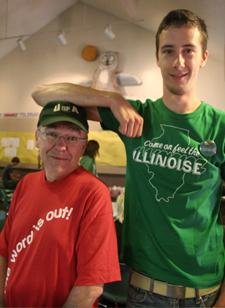When author and activist Sarah Schulman was in town this month, she noted that Edmonton is still the type of city where one person can make a big difference. She said this after spending the morning with five-time city councillor Michael Phair who had given her a tour of the city.
Driving through the poorest and richest areas of the city as per Schulman’s request, she was able to witness Phair’s ongoing legacy. From starting HIV Edmonton in 1984 to fighting long and hard for the Edmonton Arts Council, to being one of the more vocal cheerleaders for downtown improvement, Phair has worked hard to make Edmonton a vibrant city. He did all this as an out gay man.
His openness is more impressive when you consider that the key to being a good politician is coalition building, teamwork and creating community. As an out gay man in a conservative, often isolated city, Phair’s ability to bring people together, feel comfortable and do good work is the key to his success and the success of the city. Being an out gay man is something that many of us might take for granted now, but for Phair it was a perceived hurdle when he first thought about running for council. It also made him a target of hate mail and threats of violence during the heady days that followed the Vriend vs Alberta decision.
It is in Phair’s name, and hopefully though his example, that the University of Alberta’s Institute for Sexual Minority Studies and Services (ISMSS) created the Michael Phair Education Endowment, which will fund the Michael Phair Leadership Award.
The award is a $1,000 scholarship that will go to a queer University of Alberta undergraduate student who has demonstrated leadership qualities and involvement in extracurricular and community activities. As the scholarship package points out, “preference is given to students who have demonstrated commitment to the advancement of lesbian, gay, bisexual, trans-identified, two-spirited or queer communities.” It is hoped that this award will encourage a new generation of queer leaders in Alberta’s capital while also enforcing the Institute’s work in making both the U of A and Edmonton a more queer-friendly place.
For Marshall Watson, a U of A student getting his master’s degree in English, the award is important because it puts a focus on the university’s queer student body, a group he feels doesn’t get enough attention on campus. Although not eligible for the award himself because he works for the Institute, Watson hopes that other students, especially those not yet active in the community, will see the scholarship as a form of support and realize the benefits of getting involved.
The challenge as Watson sees it is getting students to know about and apply for the award. “For a lot of students,” says Watson, “being queer on campus is not a priority.” He hopes the award will help change that.
For Phair, the award in his name is an honour as well as a re-enforcement of his beliefs. Having earned a master’s degree in early childhood education as well as special education and having been a teacher in his early career, he is a strong advocate for education. “This award recognizes that the queer community is supported by the U of A,” says Phair, “and that they want queer students to stay in school and be involved in their community.”
Thanks to Phair, Edmonton continues to become a more sophisticated, cosmopolitan and urbane city to live in. With this new award, there will be leaders who can continue the work that Phair has started.

 Why you can trust Xtra
Why you can trust Xtra


